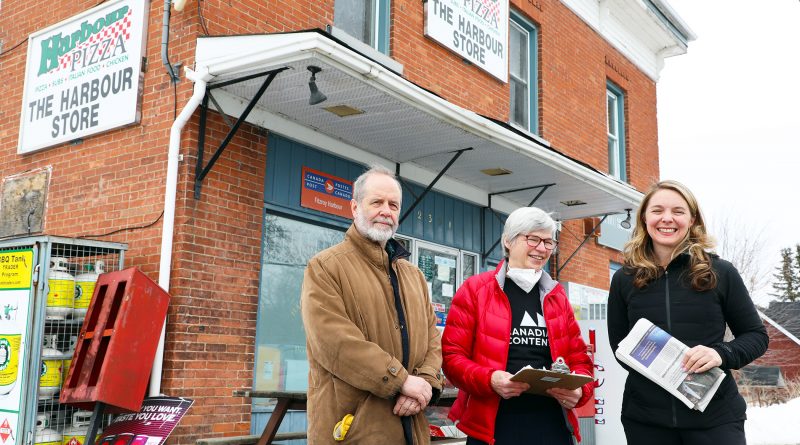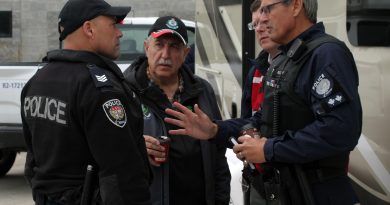Morrisons deliver journalism petition
FITZROY HARBOUR – Two weeks after starting a door-to-door campaign to gather signatures to petition the government to do more to protect Canadian journalism, Willola Beach residents Mary Jo and David Morrison have delivered said petition to their Member of Parliament.
On Wednesday (March 9), the Morrisons met Kanata-Carleton MP Jenna Sudds for a chat outside the Fitzroy Harbour General Store, a place with a few copies of the city newspaper available if you get there early enough, and zero local papers.
Mary Jo and David are concerned about the current state of Canadian journalism and content on several fronts. From so-called fake news to Facebook and Google’s domination of online advertising stealing Canadian content to control the market, to underfunding of the national broadcaster, the Morrisons feel Canadian content, publishers and broadcasters are feeling the squeeze. Especially community journalism. In West Carleton alone, five community newspapers have closed in the last 15 years.
On Feb. 23, West Carleton Online documented the efforts of the Morrisons as they launched their local petition. The petition had three key points (explained in detail in the preceding link). Ensure online platforms are forced to follow Canadian rules including content and taxes; fund the CBC to help it fill its public purpose; and make those who profit from using the news such as Facebook and Google, pay for it.
Mary Jo says gathering signatures around the communities of Fitzroy Harbour and Wilola Beach was eye-opening.
“A range of opinions,” Mary Jo told West Carleton Online from downtown Fitzroy Harbour Wednesday afternoon. “Bias is a big concern with a lot of people and people who have not been happy with some of our broadcasters including our national broadcaster. But when we get talking whether a small country needs a national broadcaster that fulfills that public function, then there’s also the aspect of accuracy. Private broadcasters, newspapers, television and radio stations, and the public one, and then there’s things like the provincial one TVOntario, they need to complement one another and do a better job of accuracy if we support them. And being a small country, we need to support them, because people have worked hard to preserve our cultural sovereignty, but it can be lost easily when a David is beside a Goliath.”
Sudds was happy to come to Fitzroy Harbour to accept the petition.
“I’m actually quite excited to be here today and get the petition, I think it’s wonderful the initiative Mary Jo and David have taken,” Sudds told West Carleton Online. “This is an important issue. Protecting Canadian content and promoting Canadian content is so important as is the CBC as our broadcaster. So, I’m quite happy to be here, I’m quite happy to hear from residents on this issue, or any issue frankly.”
Sudds says the protection of Canadian content and making sure it isn’t used to create profits for American businesses helping themselves to the product, is already underway with Bill C-11.
“As far as the government’s position, I was sharing we have done our first reading of bill C-11, so that’s one step in the right direction that’s particularly looking at redefining broadcasters,” Sudds said. “That would include Netflix and Disney TV, and that’s a big step because it would require them to have Canadian content and follow the act.”
Bill C-11, also known as the Digital Charter Implementation Act, 2020, would repeal parts of the Personal Information Protection and Electronic Documents Act and replace them with a new legislative regime governing the collection, use, and disclosure of personal information for commercial activity in Canada. As the core of this regime, the Consumer Privacy Protection Act would be enacted to maintain, modernize, and extend existing rules and to impose new rules on private sector organizations for the protection of personal information.
Sudds says she expects more help is coming.
“Secondly, our budget is upcoming and hopefully within the next month or so, and hopefully we’ll see some good news in that,” she said.
Mary Jo agrees Bill C-11 will be of benefit but there is more to do.
“And then there’s the issue of online harm, which Jenna was referring to from the aspect of the having legislation that will have protection of our Canadian values and our laws, again that we’ve worked for a long time to build up,” she said. “Even the fact of broadcasters making billions here not paying the same taxes or contributing to Canadian content at the same level. There’s a lot of areas that need to be worked on.”
David says the issue isn’t just about propping up Canadian media with funding but finding ways to safeguard the accuracy of Canadian journalism.
“The whole issue of fake news, integrity, being able to trust what you read in the newspaper, we no longer even seem to agree on the same facts, much less the same opinions,” David said. “People on social media are free to make up any disinformation they like. They’re not accountable in any way. The so-called trucker’s protest, a good lot of that was fueled by misplaced, misunderstood and outright lies on social media. The Trump phenomena in the United States. Russian propaganda over the Ukraine situation. We need to have journalism we can trust, and social media is undermining it terribly. Until we can control social media, it has good functions obviously, we can keep track of grandchildren etc., but it’s got serious, serious disadvantages that have to be reigned in”
“In the Ukraine, social media is our only source of trustworthy information of what’s going on, but we have to be realistic about its dangers,” Mary Jo said. “We talk about local newspapers closing and local radio stations. If they can’t compete in terms of advertising, we need to create a structure to protect them. Like West Carleton Online, subscribers have come forward, but I’m sure there are some really legitimate papers that have followed the rules and were forced to close anyway. We want to make sure they have a fighting chance. if your making billions in Canada and you are not paying the same sort of taxes. It’s levelling the playing field.”












Pingback:Davies: Democracy’s biggest threat – West Carleton Online
Pingback:Looking at last year in WC – West Carleton Online